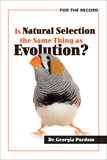
Origin of (a) Species
Scientists have watched as a new species is “born”—or is that “evolved”?—on one of the Galapagos Islands, home of Darwin’s famous finches.
News Source
Peter and Rosemary Grant have studied Darwin’s finches for decades. Now, the biologists have “witnessed that elusive moment when a single species splits in two,” BBC News reports.
The birds on the islands are popularly known for helping inspire Charles Darwin’s ideas on natural selection and speciation, hence their nickname. For that reason, the birds—as with peppered moths—are a common example of natural selection and “evolution” in action.
The Grants’ story begins with a specimen of Geospiza fortis (a medium ground finch) that flew from a neighboring island to the Grants’ island in 1981 (and was captured by the Grants). The finch was larger than most, had a wider beak, sang an unusual song, and had several genetic variations from a “foreign” finch species. After finding a mate—who also had some outsider genetic variations—the two birds had five male offspring.
It seems their distinct songs caused the male offspring to be ignored by all but their kin.
The new males were set apart from their island kin because they inherited not only their father’s large size and wide beak, but also his unique songs with some new twists. While the sons managed to find mates who were native to the island, their descendants—at least by four generations later—were only breeding with one another. It seems their distinct songs caused the male offspring to be ignored by all but their kin.
The finding was reinforced when a drought killed many of the island’s finches, including all of the foreign finch’s descendants except one male and his sister. They summarily mated with one another, as did their offspring. After more generations followed suit, the Grants decided it was time to deem the birds the first of a new species because they do not breed with the native finches.
This story is a good illustration of several creationist points:
- While some may refer to the new species as evidence of “evolution,” the term can only be fairly applied if evolution means “change.” The new species has no new genetic information, but instead only a mix of genetic information from multiple finch species that has led to reproductive isolation. Repeating similar processes for millions of years would not change these birds into anything other than birds.
- If the birds do, indeed, constitute a new species, the Grants have observed how quickly a new species can emerge. Observations such as these allow us to imagine how, after the Flood, the animals on the Ark would have rapidly spread worldwide, with their offspring splitting into more and more species as time passed (accounting for the biodiversity we see today).
- Recall that there is no evidence that the new finch species cannot breed successfully with the native finch species—only that members of the new species don’t. Even after many more generations, the old and new finches will probably still be able to have viable offspring. This is a microcosmic example of how many different species today can interbreed (e.g., horses and zebras), reminding us that they are part of the same created kind (from Genesis 1).
The Grants have done science a service in documenting in detail (and through years of arduous observation) an instance of speciation. While that confirms Darwin’s ideas about natural selection (which others had pointed out before Darwin), it provides no evidence for the idea that all species share a single common ancestor.
Further Reading
- “Evolution” of Finch Beaks—Again
- Finding God in Galapagos
- Origin of (a) Species
- Get Answers: Charles Darwin, Created Kinds (Baraminology), Genetics, Information Theory, Natural Selection, Speciation
For More Information: Get Answers
Remember, if you see a news story that might merit some attention, let us know about it! (Note: if the story originates from the Associated Press, FOX News, MSNBC, the New York Times, or another major national media outlet, we will most likely have already heard about it.) And thanks to all of our readers who have submitted great news tips to us. If you didn’t catch all the latest News to Know, why not take a look to see what you’ve missed?
(Please note that links will take you directly to the source. Answers in Genesis is not responsible for content on the websites to which we refer. For more information, please see our Privacy Policy.)
Recommended Resources

Answers in Genesis is an apologetics ministry, dedicated to helping Christians defend their faith and proclaim the good news of Jesus Christ.
- Customer Service 800.778.3390
- © 2024 Answers in Genesis



